
Affirming Its Values
Ohio Wesleyan Awards First Round of Faculty-Staff Diversity, Equity, and Inclusion Grants
DELAWARE, Ohio – Ohio Wesleyan University has awarded its first round of faculty-staff Diversity, Equity, and Inclusion (DEI) Grants to support two projects intended to help advance the campus as an antiracist space.
One of the employee grants was awarded to the three-person consortium of Phokeng Dailey, Ph.D., assistant professor of communication; Brianna Mack, Ph.D., assistant professor of politics and government; and Jason Timpson, director of the Office of Multicultural Student Affairs. Together, they will explore the topic of “Social & Political Responses to Racialized Health Messages.”
The second employee DEI Grant was awarded to the two-person team of Christopher Fink, Ph.D., associate professor of health and human kinetics, and Eugene Rutigliano, OWU’s digital initiatives librarian and curator of the OWU Historical Collection. They will work with a class of Fink’s students to expand his research into “Oral Histories of Food, Community, and Migration.”
For their project, Dailey, Mack, and Timpson “seek to expand our knowledge of how the racialized framing of illness/disease (COVID-19; HIV/AIDS; opioid addiction) may lead to increased/decreased public policy support,” according to their project proposal. “We will use the results of this study to provide concrete recommendations to OWU’s health center regarding health messaging strategies that are likely to increase student compliance with recommended health prevention behaviors (such as masking) and utilization of campus health resources (such as counseling). …
“While we understood the need for and supported the use of masks on campus, to minimize transmission of COVID-19, we simultaneously recognized that the risks associated with complying with such a policy were simply not the same for all students,” they state. “This shared awareness led to discussion about other ways in which health messaging on campus fails to account for reasons why Black and brown students might be less likely to seek out and utilize health resources provided by OWU. Our motivation is simple: We want to do work that offers tangible recommendations for our institution to create spaces on campus where all of our students feel seen and more importantly safe.”
As for Fink and Rutigliano, they state: “Food and community are multifaceted and inform each other – food serves as an identity marker and a connector for diverse groups and local traditions. This project explores the interplay between food, race, immigration, and community through the collection of oral histories describing the lived experiences of immigrant and BIPOC (Black, Indigenous, and People of Color) communities.”
Their project, they continue, “will address DEI issues in two ways – first, the elevation of voices from the BIPOC and immigrant communities in Delaware, Ohio – and second, the recording of experiences from students. We believe the community and student stories will be impactful for both the Delaware community and OWU students, and that a public exhibition and conversation about the project results (at OWU in fall 2021) will result in dialog and anti-racist work on our campus.”
The project opportunity emerged through a collaboration with the Delaware African American Heritage Council, Fink said. Founded in 2018, the council seeks to “lead the Delaware community in understanding the African American experience.” Its efforts have included offering anti-racist training, launching a citywide Black History Month program, partnering with Delaware City Schools to enrich the district’s curriculum, and establishing the Ujima Consortium to help BIPOC address social justice issues in city and county government, and law enforcement spaces.
Ohio Wesleyan’s Diversity, Equity, and Inclusion Grant program is overseen by the university’s Council on Diversity, Equity, and Inclusion. It was launched this spring with both student and faculty-staff funding categories.
Dawn Chisebe, OWU’s interim chief diversity officer, said the council was impressed by the newest proposals. “We expected to award one faculty-staff grant this semester,” she said, “but we decided to give out two grants in recognition of the quality and potential impact of the projects. There were some amazing proposals!”
The first student grant was awarded earlier this spring to junior Reese Little of Short Hills, New Jersey, to support the OWU chapter of First Generation Investors that he founded in fall 2020. The nonprofit 501(c)3 organization teaches high school students in underserved communities the power of stock-market investing and provides them with $100 each to invest.
Ohio Wesleyan’s DEI Grant Program is part of the university’s larger Diversity, Equity, and Inclusion Action Plan. The plan was launched in June 2020 to “create meaningful and immediate change” in four areas: the structure and policies the university uses to strengthen equitable and inclusive practices, the ways it delivers its core mission of teaching and learning, the ways it recruits and retains students and employees, and the measures it uses to ensure the campus climate affirms “clearly and boldly” the values of diversity, equity, and inclusion.
Learn more about Ohio Wesleyan’s DEI Grant program at owu.edu/DEIGrants and more about the DEI Action Plan at owu.edu/DEIActionPlan.
Founded in 1842, Ohio Wesleyan University is one of the nation’s premier liberal arts universities. Located in Delaware, Ohio, the private university offers more undergraduate majors than many universities its size and competes in 24 NCAA Division III varsity sports. Through its signature program, The OWU Connection, Ohio Wesleyan teaches students to integrate knowledge across disciplines, build a diverse and global perspective, and apply knowledge in real-world settings. Ohio Wesleyan is featured in the book “Colleges That Change Lives” and included on the U.S. News & World Report and Princeton Review “best colleges” lists. Learn more at owu.edu.
